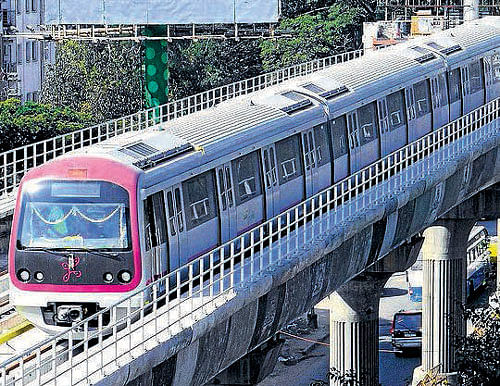
Govt not supporting eco-friendly measure that can earn money
The Bangalore Metro Rail Corporation Ltd (BMRCL) is yet to start carbon auditing for the MG Road-Baiyappanahalli stretch on which commercial operations began more than two years ago.
The delay, claim officials concerned, is due to huge expenditure involved in auditing, falling carbon price in the international market and lack of government support.The Delhi Metro has, however, already started carbon crediting. Also, it has made advance sales of 41,000 tonnes of carbon credit from 2007-17 to Japan under the first project and is even chalking out modalities for the second project.
Carbon crediting is a ‘clean development mechanism’ that is adopted by developing countries. As per an agreement signed under the United Nations Framework for Climate Change, nations are paid to adopt green projects and carbon is ‘traded’ as an immediate answer to reduce greenhouse gas emissions.
It is calculated through two mechanisms: One, where energy is ‘converted’ into carbon and collected and sold in the international market for a price. Another is where mass transport companies calculate the amount of fuel saved by getting people to shift from personalised transport to public transport.
U A Vasanth Rao, general manager (finance), BMRCL, told Deccan Herald that the Namma Metro project was envisaged as a mechanism for carbon crediting, when the project was being operationalised. BMRCL, however, is yet to appoint an agency for the auditing, to find out how much carbon credit it can get and how much it will benefit the company.
Rao pointed out that auditing through a private agency was very expensive. Past interactions with private organisations have been futile. BMRCL has realised that investment is high, but returns are minimum. Apart from clean emissions, the aim of carbon trading is to make money, which can be utilised for infrastructural works, he added.
Prof N H Ravindranath from the Centre for Ecological Sciences, IISc, however, opined that Namma Metro was an ongoing project and does not qualify for carbon trading now. Carbon trading can be done for additional climate change-related activities of an existing dedicated project, like BMTC and KSRTC shifting to use of biofuels or alternative fuels.
The BBMP too can go for carbon crediting, if it effectively implements its waste treatment programmes. Bescom also can harness solar energy to help reduce emissions. For BMRCL, however, the current fuel emission rate per passenger per vehicle is low.Ravindranath said that if BMRCL wants to trade carbon, it will have to wait longer as the price of carbon too has dropped in international market. Four years ago, the rate was about $ 50 per tonne, while now it is merely 70 cents.
Experts in the Centre for Science and Environment, who oppose carbon crediting, say that it is a method merely to make both developing nations and major projects pay for development, while the developed nations do nothing. They added, however, that changing from private to public transport is the need of the hour and it is such projects that the government should support.